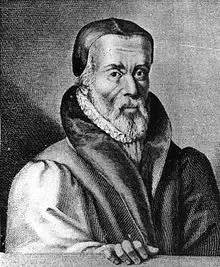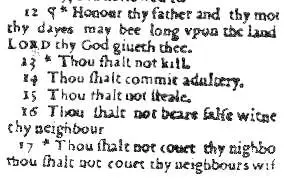We owe it so much that it's easier to just take it for granted, but this year, the King James Version of the Bible turns 400. That's four centuries of borrowed expressions and turns of phrase. Four centuries of influence imposed on our language by the books of Genesis, Revelation, and everything in between.
Nowadays, it might seem that we're too enlightened, too comfortably embedded in our own secular humanism to need the Bible anymore. Sure, we can turn to it for a good story from time to time, but does it really deserve much more attention than that? If you've ever written the phrase, "from time to time" (Ezekiel 4:10), then it does. That quote comes as a direct courtesy of good old King James. If you've ever claimed to be "broken-hearted" (Luke 4:18) then you've quoted from the Good Book. In fact, there's a good chance you use biblical expressions every day. During an argument, you've probably asked someone not to "put words in your mouth" (Exodus 4:15) — or you've told them not to act so "holier than thou" (Isaiah 65:5) — or you've felt like a "scapegoat" (Leviticus 16:10)— or your words turned out to be a "two-edged sword" (Hebrews 4:12) — or, "woe is you" (1 Corinthians 9:16), you saw a precious relationship crumble "in the twinkling of an eye" (1 Corinthians 15:52). Or whatever. The English language is more than a repository for Biblical phrases, but the sheer scope of the Bible's influence is incredible. The expressions it spawned have seen their religious overtones erode. Now they are part of what we live and speak. They're secular things.
 One word that recurs throughout accounts of how the King James Version came to be is "risk". Four hundred years ago, this translation was a dangerous thing to even conceive of, let alone undertake. When William Tyndale (born in 1494) began, in secrecy, to translate the Bible into English, he was taking a risk that ended up costing him his life. Tyndale wanted to get away from the Latin, from Rome, from the shackles of the Vatican. Back then the Church oversaw most of society. It was not in the Vatican's interests to let the stupid masses have direct access to the holy texts on which the system had been founded.
One word that recurs throughout accounts of how the King James Version came to be is "risk". Four hundred years ago, this translation was a dangerous thing to even conceive of, let alone undertake. When William Tyndale (born in 1494) began, in secrecy, to translate the Bible into English, he was taking a risk that ended up costing him his life. Tyndale wanted to get away from the Latin, from Rome, from the shackles of the Vatican. Back then the Church oversaw most of society. It was not in the Vatican's interests to let the stupid masses have direct access to the holy texts on which the system had been founded.
So they had Tyndale murdered. He was burned at the stake decades before King James, an unusually learned man and scholar, made the, uh, fucking tricky political move of commissioning an English-language version of the Bible. This would serve him well: on the one hand, his name would be forever associated with the first authoritative English-language translation of the most important book in the world, so that all the other partial (and perhaps heretical) translations would lose their use. On the other hand, to have "one doctrine and one discipline, one religion in substance and in ceremony" would help him to consolidate his power. There were many objections. He ignored them.
The work that William Tyndale had started but never finished (we now call it the Tyndale Bible) served as the most important reference point for the newly appointed translators: over fifty of them, brilliant men who came up with a proto-democratic arrangement for how things were to be done. Some of them would focus on the Old Testament, others on the New. Particular parts were scrutinized and argued over for lengths of time we might today consider a tad excessive. Overseeing all of this work was King James himself.
 While some problems arose (one early edition of this Bible omitted the "not" from "Thou shalt not commit adultery," leading, no doubt, to many sexy misunderstandings) and some of the language was purposefully archaic, even by the standards of the time, the result of this enterprise was a masterpiece of the highest literary merit. A book with lines so memorable that they quickly slipped into the way people expressed themselves when the Bible was closed and they were off living their lives. The King James Bible was, in a great number of ways, the starting point for Really Highbrow English Literature. Authors from William Blake, the Brontes, Coleridge, and Defoe on through Herman Melville and William Faulkner (and more recently Cormac McCarthy) have all grappled with the legacy that the KJV left behind.
While some problems arose (one early edition of this Bible omitted the "not" from "Thou shalt not commit adultery," leading, no doubt, to many sexy misunderstandings) and some of the language was purposefully archaic, even by the standards of the time, the result of this enterprise was a masterpiece of the highest literary merit. A book with lines so memorable that they quickly slipped into the way people expressed themselves when the Bible was closed and they were off living their lives. The King James Bible was, in a great number of ways, the starting point for Really Highbrow English Literature. Authors from William Blake, the Brontes, Coleridge, and Defoe on through Herman Melville and William Faulkner (and more recently Cormac McCarthy) have all grappled with the legacy that the KJV left behind.
And this year marks the 400th anniversary of this enormous book. You don't need to believe in God (I don't) to believe that the book was a miracle (I do). If you haven't cracked open the Bible in a while, or ever, then give it a try and see. Read the Gospel of John and drink a beer.
Praise be to Tyndale, King James and the English language.

About the author
Phil Jourdan is a writer, musician and distinctly unenlightened person. He is structural editor at Angry Robot, and a co-founder of Repeater Books and Litreactor. He splits his time between the UK and Argentina.







